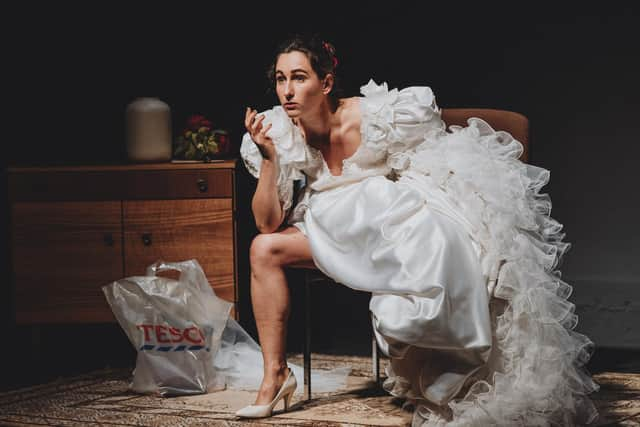Edinburgh Festival Fringe theatre, musical and opera reviews: Lovefool | Actually, Love | Strategic Love Play | Please Love Me
THEATRE
Lovefool ****
Summerhall (Venue 26) until 27 August
MUSICALS AND OPERA
Actually, Love ***
Pleasance Courtyard (Venue 33) until 27 August
THEATRE


Strategic Love Play ****
ROUNDABOUT @ Summerhall (Venue 26A) until 27 August
THEATRE
Please Love Me ****


Pleasance Dome (Venue 23) until 26 August
“What is love?” goes the Haddaway song at the beginning of this one-woman show that, like many others at this year’s Fringe, is actually often about what it isn’t. Narrated by a seemingly stoic actress called Grace (played by Kristin Winters), Lovefool takes us from the clunky dialogue of an audition and into a new relationship with a man seeming entirely comprised of red flags. “The greatest love of all is the easiest to achieve,” Grace repeats, script in hand, trying to make it sound better. She knows it’s nonsense, but when children endlessly describe an ideal woman as “good”, “ kind” and “not too bossy”, Grace finds depictions of passive femininity, along with a partner who uses them to control her, difficult to escape.
Through a direct-to-audience performance by Winters, Gintare Parulyte’s unfolding script slowly reveals how what one person believes to be love can be used by another to carry out actions of hate. By the time Grace is back in the audition room, the hollowness of the messages behind romantic cliches have become clear, as have the depths of their destruction. In this emotionally confrontational show we are also asked to assess the relationships in our own lives. Turning her attention to self-love, Grace’s long-awaited rebuff to all of the noise elsewhere is a great moment: “F*** off.”
Advertisement
Hide AdAdvertisement
Hide AdThe defiant mood continues in queer musical Actually, Love where a frustrated composer Alex is trapped behind a keyboard, trying to thrash out a commercially successful love song. Surely, it’s just three chords and something about sunsets? Also at the studio is actor Stevie, who’s rehearsing for an audition to be the lead in a romcom. Together they try and work out what works, through concocting scenes familiar from Hollywood blockbusters. The result? A hapless woman from New York who keeps dropping things who meets a man with a plan to help her save her struggling antiques shop. Things have to be formulaic but not too formulaic, Alex says – a description that could also be applied to the whole show, as the duo debate their differences and make musical numbers out of the conventions of a genre that Alex claims to hate but also seems to inhabit.
A Gay Best Friend is, as the two finally agree, “the best character”, delivering the standard makeover scene like a takeaway dinner, but – aided by writer/performer Sam Woof and Jordan Broatch’s great on-stage dynamic – also some more original observations. Occasionally, the energy overspills. “Why is femininity so ridiculous?” Alex asks, hysterical in a way that could also be accused of something similar. Moving on to an overbearing mother “ridiculed for her maternal instinct”, it’s a piece that playfully pulls to bits every archetype it can gets its hands on. With Stevie laid-back about playing a heterosexual male lead (“I’m an actor”) and Alex cynical about selling out, their opposites-attract, art-versus-commerce dynamic leads their relationship to a true to the form – but also heartfelt – Hollywood conclusion.
Chemistry also comes from conflict in Miriam Battye’s defiantly unromantic Strategic Love Play, where it’s the formulaic structure of internet dating that is attacked. In this anti-romcom, a straight-talking woman takes a metaphorical baseball bat to the faux-niceties of what is often a brutal process while on a date with a middle-of-the-road man who just wants to leave, but for some reason can’t. Despite seemingly having no connection apart from the watered-down beer that they’re both drinking, they’re held together by the energy of Battye’s robust writing, which is not so much permeated by cynicism as powered by it.
These two mismatched characters are not easy to spend time with. She says the unsayable, sick of the standard subtext behind the recognisable language of rejection. He goes to painful attempts to avoid “being mean” – just the kind of man she’s complaining about. They’re both difficult to like or even get to know but, with thanks to the conventions of romantic fiction you might find yourself thinking: could it perhaps work? A demonstration of what might happen if relationships were seen in terms of starting a war rather than finding love, Strategic Love Play questions whether online dating is creating or killing connection, by replacing it with something colder: the search for self-affirmation and power.
In Please Love Me, a woman high-fives the audience. “Love you,” she says, clearly expecting us to say it back, in between spinning around her on-stage pole. Lime green is a key component of her outfit. (The other is there’s not much of it.) But Clementine “Clem" Bogg-Hargroves is more sweet than sexy, self-aware of her neediness, which is underpinning by a Yorkshire-based robustness and sunny charm that wouldn't be out of place on a beach in California.
Watched over by her ever-despairing friend, collaborator and keyboard player Zoey Barnes this semi-autobiographical show tells the story of her younger self trying to find love through appearing available and seemingly unable to escape the supposed magnetic qualities of an extremely mediocre boy called Ben.
Soon Clem is pole dancing in Edinburgh infamous ‘pubic triangle’ of strip bars – a skill that is imaginatively transferred here to tell the non-sexual, more emotional parts of what could have been a simple confessional monologue in a way that’s quietly defiant and maybe even subversive. Seeking validation from the audience in the same way she does men, a song that demands “love me” questions whether the strip club and the Fringe stage are just two different forms of addiction.
Advertisement
Hide AdAdvertisement
Hide AdBeat poetry, songs and synchronised dance routines to tinny tunes evoke a more innocent kind of performance – that of two kids putting on a show. Being sexualised very young is confusing, Clem says; it scrambles the relationship between sex, love and trust. “I love you,” she says to us. “I love you more,” we dutifully reply. It feels cheesy at first, meaningless midway through, but by the end it has turned into something more real.